Project Management Professional (PMP)®
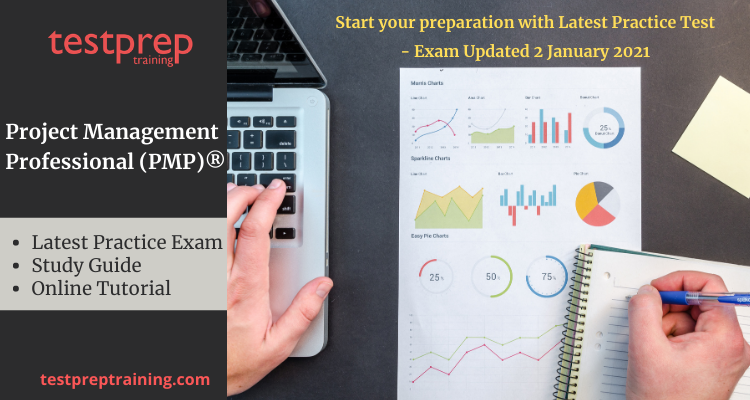
Project Management Professional Certification Exam is one of the most popular internationally recognized professional designation offered by the Project Management Institute (PMI). Project Management Professional Certification (PMP)® certification demonstrates that you possess project management knowledge, experience and skills to bring projects to successful completion. Moreover, as the demand for skilled project managers is at a critically urgent level, practitioners who hold the PMP certification are well-positioned to provide the professional skills necessary to lead project teams and achieve successful project results.
Therefore, to stand out in the crowd you need to showcase your skills and prove yourself better than others. Project Management Professional Certification Exam helps your employers and colleagues know about your skills in the project management domain. A project management professional certification holder earns 25% more than a non-certification holder in the US. The PMP delivers value far into your career. The certification depicts that you have real-life project management experience. So, let us get into the details of this exam and learn about all the learning resources. Let us get underway.
Why take Project Management Professional (PMP) Exam?
Clearly, the Project Management Professional (PMP) aims to deliver value far to your career. Moreover, as per statistics, the PMP exam is ranked amongst the top project management certification as it proves that you have the specific skills and experience employers seek. Certified PMPs report earning up to 25% more than non-certified project management professionals.
Who should take the exam?
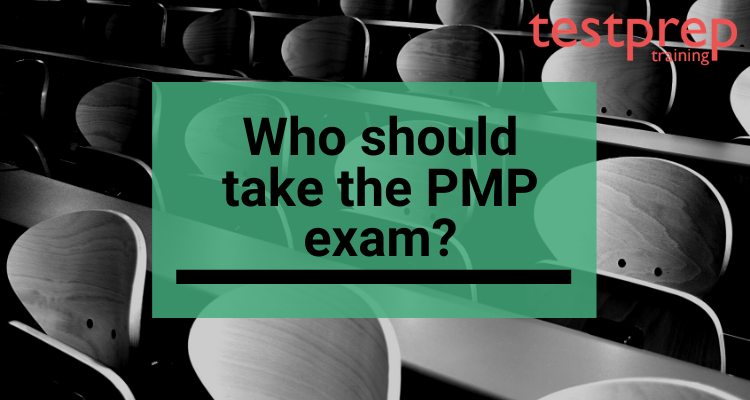
There is no restriction as to a specific subject for the Project Management Professional Certification Exam. Any person who has a good level of experience in the profile of project manager and is responsible for handling the allied responsibilities can take the exam.
Exam overview
Project Management Professional Certification Exam consists of 200 questions which have to be answered in time duration of 2 hours. The exam is available only in English language. Moreover, the Project Management Professional Test Questions are in multiple-choice and multiple select format. The cost of registration for the exam is US $405 for members and US $555 for non-members. However, the passing score for the exam is not given by PMI and grading system prevails as the method for the results. This PMI certification is valid for 3 years, and you have to get re-certified after this time period by earning PDUs. You can register for the exam by visiting pmi.org and creating an account.
Exam Details
| Name of the exam | Project Management Professional (PMP) |
| Duration of the exam | 230 minutes |
| No. of questions asked | 180 questions |
| Registration fees | US $405 for members and US $555 for non-members |
| Language in which exam is available | English |
| Validity of certification | 3 years |
| Type of questions asked | Multiple-choice, Multiple Response, Hotspot and Fill in the Blanks |
| Exam code | (PMP)® |
How to get your PMP Certification Exam?
In order to earn the PMP Certification, it is important to make sure you meet the given sets of PMP Certification requirements –
- A four-year degree
- 36 months leading projects
- 35 hours of project management education/training or CAPM® Certification
— OR —
- A high school diploma or an associate’s degree (or global equivalent)
- 60 months leading projects
- 35 hours of project management education/training or CAPM® Certification
Recertification Policy
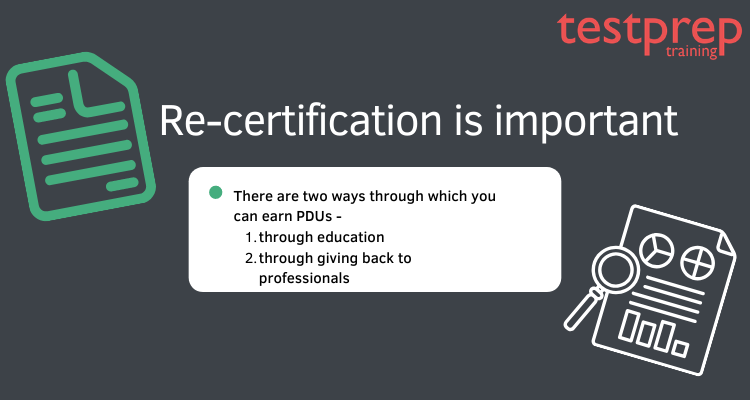
Project Management Professional Certification Exam is valid for 3 years after you pass the certification. For recertification the candidate must collect a certain number of PDUs – Professional Development Units. For the Project Management Professional Certification Exam around 60 PDUs are required across different domains as technical, leadership, strategic etc. There are two ways through which you can earn PDUs- through Education or through giving back to professionals. The certification renewal fees for members is $60 and for non-members is $150.
Certification status
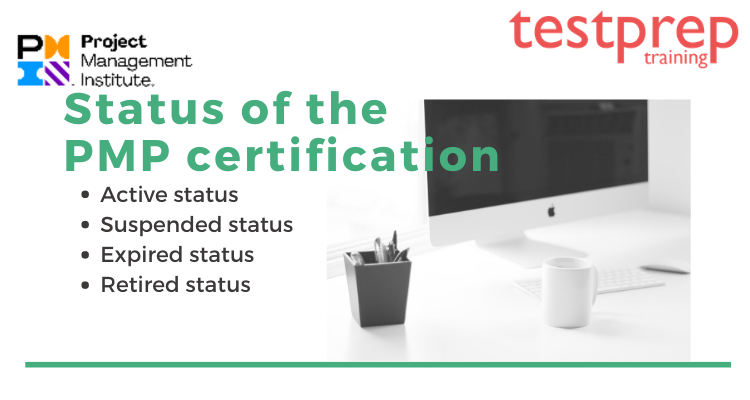
- When you first earn a certification, you are considered to be in active status. When you fulfill all CCR requirements for your certification, including earning and reporting PDUs as well as submitting the renewal payment before the cycle end date, you are in good standing with an active status.
- If you do not satisfy the CCR program requirements within your current cycle dates, you will be placed in suspended status. The suspension period lasts one year (12 months). If you are in suspended status, you may not refer to yourself as a certification holder or use the certification designation until you earn the necessary PDUs or complete the renewal process within the one-year suspension period.
- If you do not earn the necessary PDUs or do not complete the renewal process within the suspension period, you will lose your certification and go into an expired status.
- If you are a certification holder in good standing and wish to voluntarily relinquish your active status due to retirement, you are eligible to apply for retired status.
Passing score
The passing score for the exam is not given by PMI and grading system prevails as the method for the results. So, you need to make sure that you prepare well to pass the exam. The certificate that you will receive upon passing will look somewhat like-
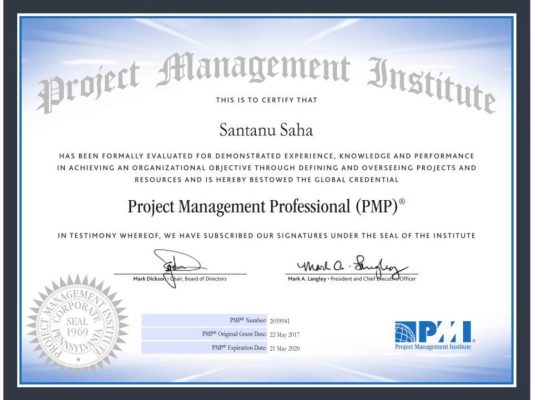
Retake policy
If any candidate has not passed the exam on your first attempt you may now re-test up to two more times within your one-year eligibility period by submitting a completed re-examination form and paying the associated re-examination fee currently $275 for PMI members and $375 for members.
Other exam policies
Make sure to visit the official site for this exam before you start preparing for the exam. This will help you to not to miss out on anything important
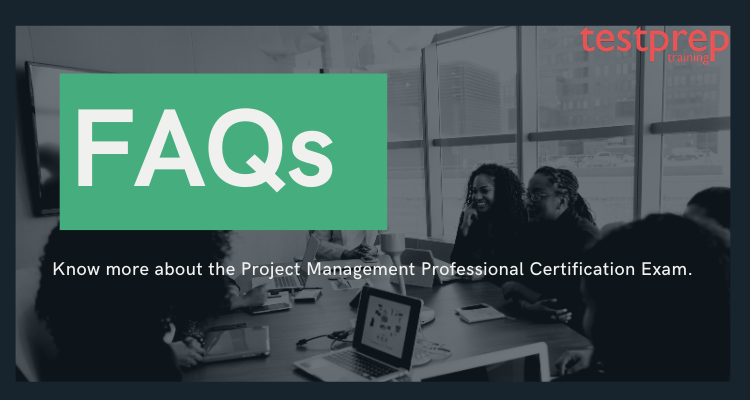
To know more about the certification, visit: PMP exam FAQs
Project Management Professional (PMP)® Interview Questions
Now, Let us look at some Project Management Professional (PMP)® Interview Questions which would help you get an idea about what questions can be asked in the interview and how to prepare for them.

Course Structure for Project Management Professional Certification (PMP)®
The Project Management Professional Course is as per the updated version as on 2 January 2021 –
Domain I – People — 42%
Task 1 – Manage conflict
- Interpret the source and stage of the conflict
- Analyze the context for the conflict
- Evaluate/recommend/reconcile the appropriate conflict resolution solution
Task 2 – Lead a team
- Set a clear vision and mission
- Support diversity and inclusion (e.g., behavior types, thought process)
- Value servant leadership (e.g., relate the tenets of servant leadership to the team)
- Determine an appropriate leadership style (e.g., directive, collaborative)
- Inspire, motivate, and influence team members/stakeholders (e.g., team contract, social contract, reward system)
- Analyze team members and stakeholders’ influence
- Distinguish various options to lead various team members and stakeholders
Task 3 – Support team performance
- Appraise team member performance against key performance indicators
- Support and recognize team member growth and development
- Determine appropriate feedback approach
- Verify performance improvements
Task 4 – Empower team members and stakeholders
- Organize around team strengths
- Support team task accountability
- Evaluate demonstration of task accountability
- Determine and bestow level(s) of decision-making authority
Task 5 – Ensure team members/stakeholders are adequately trained
- Determine required competencies and elements of training
- Determine training options based on training needs
- Allocate resources for training
- Measure training outcomes
Task 6 – Build a team
- Appraise stakeholder skills
- Deduce project resource requirements
- Continuously assess and refresh team skills to meet project needs
- Maintain team and knowledge transfer
Task 7 – Address and remove impediments, obstacles, and blockers for the team
- Determine critical impediments, obstacles, and blockers for the team
- Prioritize critical impediments, obstacles, and blockers for the team
- Use network to implement solutions to remove impediments, obstacles, and blockers for the team
- Re-assess continually to ensure impediments, obstacles, and blockers for the team are being addressed
Task 8 – Negotiate project agreements
- Analyze the bounds of the negotiations for agreement
- Assess priorities and determine ultimate objective(s)
- Verify objective(s) of the project agreement is met
- Participate in agreement negotiations
- Determine a negotiation strategy
Task 9 – Collaborate with stakeholders
- Evaluate engagement needs for stakeholders
- Optimize alignment between stakeholder needs, expectations, and project objectives
- Build trust and influence stakeholders to accomplish project objectives
Task 10 – Build shared understanding
- Break down situation to identify the root cause of a misunderstanding
- Survey all necessary parties to reach consensus
- Support outcome of parties’ agreement
- Investigate potential misunderstandings
Task 11 – Engage and support virtual teams
- Examine virtual team member needs (e.g., environment, geography, culture, global, etc.)
- Investigate alternatives (e.g., communication tools, colocation) for virtual team member engagement
- Implement options for virtual team member engagement
- Continually evaluate effectiveness of virtual team member engagement
Task 12 – Define team ground rules
- Communicate organizational principles with team and external stakeholders
- Establish an environment that fosters adherence to the ground rules
- Manage and rectify ground rule violations
Task 13 – Mentor relevant stakeholders
- Allocate the time to mentoring
- Recognize and act on mentoring opportunities
Task 14 – Promote team performance through the application of emotional intelligence
- Assess behavior through the use of personality indicators
- Analyze personality indicators and adjust to the emotional needs of key project stakeholders
Domain II – Process — 50%
Task 1 – Execute project with the urgency required to deliver business value
- Assess opportunities to deliver value incrementally
- Examine the business value throughout the project
- Support the team to subdivide project tasks as necessary to find the minimum viable product
Task 2 – Manage communications
- Analyze communication needs of all stakeholders
- Determine communication methods, channels, frequency, and level of detail for all stakeholders
- Communicate project information and updates effectively
- Confirm communication is understood and feedback is received
Task 3 – Assess and manage risks
- Determine risk management options
- Iteratively assess and prioritize risks
Task 4 – Engage stakeholders
- Analyze stakeholders (e.g., power interest grid, influence, impact)
- Categorize stakeholders
- Engage stakeholders by category
- Develop, execute, and validate a strategy for stakeholder engagement
Task 5 – Plan and manage budget and resources
- Estimate budgetary needs based on the scope of the project and lessons learned from past projects
- Anticipate future budget challenges
- Monitor budget variations and work with governance process to adjust as necessary
- Plan and manage resources
Task 6 – Plan and manage schedule
- Estimate project tasks (milestones, dependencies, story points)
- Utilize benchmarks and historical data
- Prepare schedule based on methodology
- Measure ongoing progress based on methodology
- Modify schedule, as needed, based on methodology
- Coordinate with other projects and other operations
Task 7 – Plan and manage quality of products/deliverables
- Determine quality standard required for project deliverables
- Recommend options for improvement based on quality gaps
- Continually survey project deliverable quality
Task 8 – Plan and manage scope
- Determine and prioritize requirements
- Break down scope (e.g., WBS, backlog)
- Monitor and validate scope
Task 9 – Integrate project planning activities
- Consolidate the project/phase plans
- Assess consolidated project plans for dependencies, gaps, and continued business value
- Analyze the data collected
- Collect and analyze data to make informed project decisions
- Determine critical information requirements
Task 10 – Manage project changes
- Anticipate and embrace the need for change (e.g., follow change management practices)
- Determine strategy to handle change
- Execute change management strategy according to the methodology
- Determine a change response to move the project forward
Task 11 – Plan and manage procurement
- Define resource requirements and needs
- Communicate resource requirements
- Manage suppliers/contracts
- Plan and manage procurement strategy
- Develop a delivery solution
Task 12 – Manage project artifacts
- Determine the requirements (what, when, where, who, etc.) for managing the project artifacts
- Validate that the project information is kept up to date (i.e., version control) and accessible to all stakeholders
- Continually assess the effectiveness of the management of the project artifacts
Task 13 – Determine appropriate project methodology/methods and practices
- Assess project needs, complexity, and magnitude
- Recommend project execution strategy (e.g., contracting, finance)
- Recommend a project methodology/approach (i.e., predictive, agile, hybrid)
- Use iterative, incremental practices throughout the project life cycle (e.g., lessons learned, stakeholder engagement, risk)
Task 14 – Establish project governance structure
- Determine appropriate governance for a project (e.g., replicate organizational governance)
- Define escalation paths and thresholds
Task 15 – Manage project issues
- Recognize when a risk becomes an issue
- Attack the issue with the optimal action to achieve project success
- Collaborate with relevant stakeholders on the approach to resolve the issues
Task 16 – Ensure knowledge transfer for project continuity
- Discuss project responsibilities within team
- Outline expectations for working environment
- Confirm approach for knowledge transfers
Task 17 – Plan and manage project/phase closure or transitions
- Determine criteria to successfully close the project or phase
- Validate readiness for transition (e.g., to operations team or next phase)
- Conclude activities to close out project or phase (e.g., final lessons learned, retrospective, procurement, financials, resources)
Domain III Business Environment — 8%
Task 1 – Plan and manage project compliance
- Confirm project compliance requirements (e.g., security, health and safety, regulatory compliance)
- Classify compliance categories
- Determine potential threats to compliance
- Use methods to support compliance
- Analyze the consequences of noncompliance
- Determine necessary approach and action to address compliance needs (e.g., risk, legal)
- Measure the extent to which the project is in compliance
Task 2 – Evaluate and deliver project benefits and value
- Investigate that benefits are identified
- Document agreement on ownership for ongoing benefit realization
- Verify measurement system is in place to track benefits
- Evaluate delivery options to demonstrate value
- Appraise stakeholders of value gain progress
Task 3 – Evaluate and address external business environment changes for impact on scope
- Survey changes to external business environment (e.g., regulations, technology, geopolitical, market)
- Assess and prioritize impact on project scope/backlog based on changes in external business environment
- Recommend options for scope/backlog changes (e.g., schedule, cost changes)
- Continually review external business environment for impacts on project scope/backlog
Task 4 – Support organizational change
- Assess organizational culture
- Evaluate impact of organizational change to project and determine required actions
- Evaluate impact of the project to the organization and determine required actions
Learning Resources for Project Management Professional (PMP)
There are numerous resources that can be used for preparation. But cracking the certification becomes difficult when the set of resources chosen is not apt. You should be very careful while choosing the resources as they will determine actually how well you will pass the exam. Let us have a look at a handful of resources with the Pmp Project Management Professional Exam Study Guide.
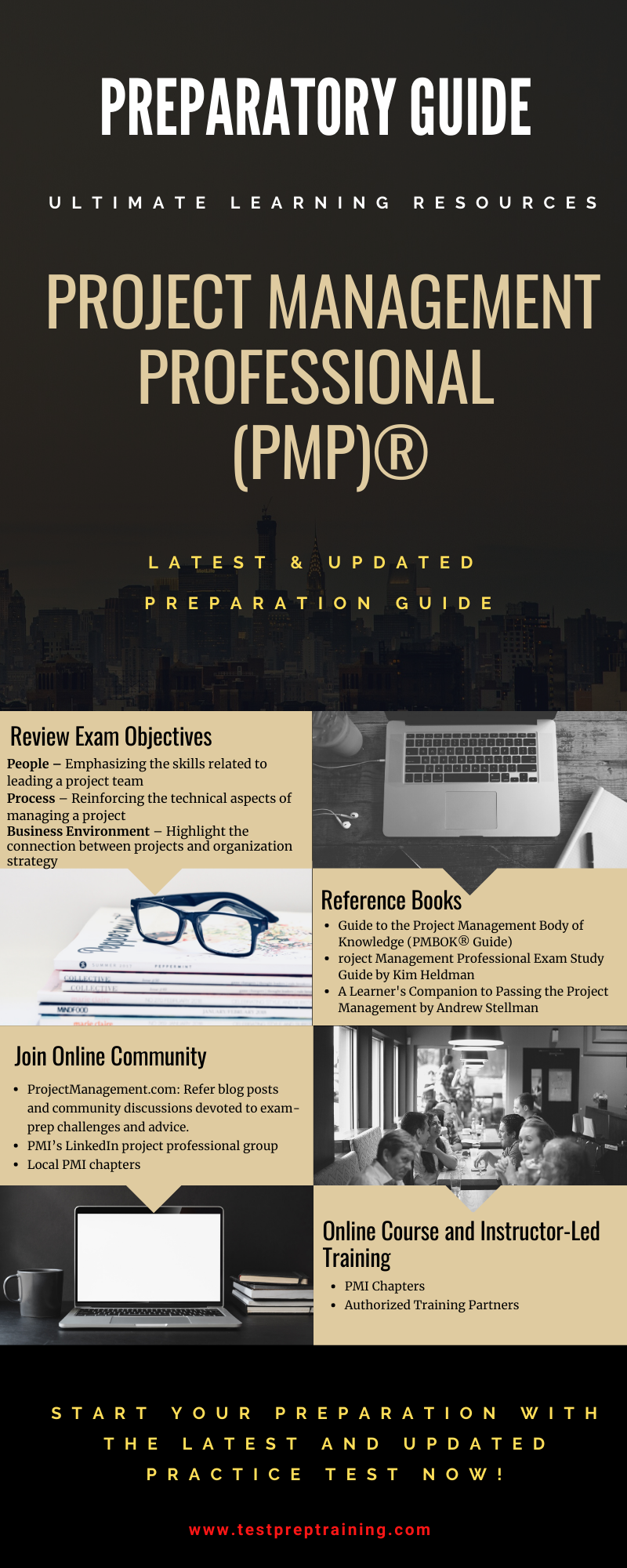
Resource 1: Books the Ultimate Guide
Books are the most valuable and reliable source for collecting the information relating to the theoretical concepts of the syllabus. You can refer to as many books as you want and can get them from bookstores or libraries. Make sure that the books you select has all the necessary concepts that will be asked in the exam. also, the book should offer maximum practice exercises that will help to understand better and learn the things for a long time. The book prescribed by the PMI is – A Guide to the Project Management Body of Knowledge (PMBOK® Guide).
- Firstly, a Guide to the Project Management Body of Knowledge (PMBOK® Guide) is a go-to reference book.
- PMP: Project Management Professional Exam Study Guide by Kim Heldman
- Head First PMP: A Learner’s Companion to Passing the Project Management by Andrew Stellman (Author)
- Also, the Project Management Professional Pmp Handbook
Resource 2: Taking the Online classes and Instructor-Led Training
You can also refer to Project Management Professional Training and online classes in order to clear the concepts and develop a strong understanding. Since the person taking the exam is already experienced in the field of project management. He is completely trained in the practical aspects of the exam. more focus should now be paid to the theoretical aspect which can be made strong by getting trained from experts or by getting classes by a reliable organization.
Resource 3: Referring to Online Community
Online communities consist of professions in the specific field or the people who are interested in the similar arena. So, don’t be hesitant in asking the questions over this platform. You can also ask for the study strategy or about the resources that were referred by them in order to clear the exam. you can refer to the following clubs as prescribed by PMI:
- ProjectManagement.com: Plenty of blog posts and community discussions are devoted to exam-prep challenges and advice.
- PMI’s LinkedIn project professional group: A great place to post a question about the exam-prep process when you’ve hit a wall.
- Local PMI chapters: These can be another resource when you need a hand.
Resource 4: Evaluating your self with Practice Test
The Pmp Project Management Professional Practice Tests are one way to evaluate your progress. They help you in identifying week portions of your preparation. You get to know about your loopholes and this reduces the chances of silly mistakes which can affect your result in a bad manner. There are many reliable sites which helps you by providing sample papers and test series. Some provide free practice tests too. Try a free practice test now! Make sure to practice as much as you can in order to reach the best level.
Additional Resources and Tips to Prepare for the PMP Updated Exam
- Learn about the PMP Exam Updates
- Review the PMP Handbook.
- Enrol in a formal study course. You can also review self-study books published by other reputable training organizations.
- Review the latest edition of A Guide to the Project Management Body of Knowledge (PMBOK® Guide) – Sixth Edition.
Validate your skills and Climb up the corporate ladder by taking the Project Management Professional Certification Exam. Start preparing for the Project Management Professional Certification Exam now!

